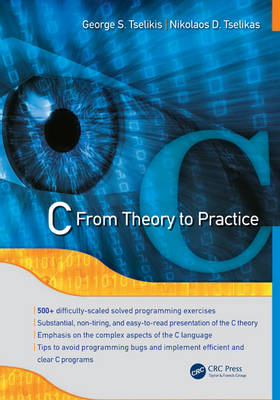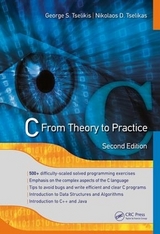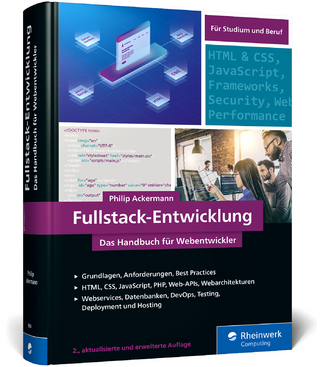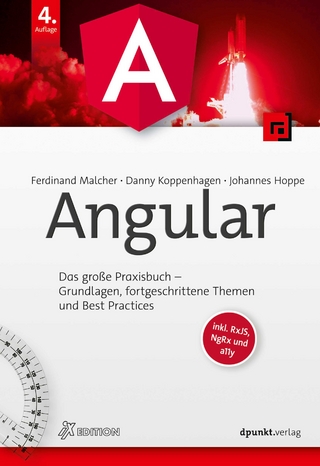
C
Crc Press Inc (Verlag)
978-1-4822-1450-5 (ISBN)
- Titel erscheint in neuer Auflage
- Artikel merken
Introduces the basic concepts of C, like getting input from a user, C’s operators, selection statements, and loops.
Emphasizes major features of C such as arrays, pointers, functions and strings.
Covers advanced topics such as like searching and sorting arrays’ algorithms, structures and unions, memory management, the preprocessor and files.
The book tests the skills of beginners and advanced developers by providing an easy-to-read compilation of the C theory enriched with tips and advice as well as difficulty-scaled solved programming exercises. It decodes the secrets of the C language, providing inside information and programming knowledge through practical examples and meaningful advice. The examples are designed to be short, concrete, and substantial, quickly giving students the know-how they need.
Dr. George S. Tselikis received his Dipl–Ing and his PhD from the School of Electrical and Computer Engineering of National Technical University of Athens (NTUA) in 1993 and 1997, respectively. In 1998, he joined the COMET group in the Center for Telecommunications Research at Columbia University, New York and worked as a postdoc research associate. He was a founding member of 4Plus S.A. (1999-2013), where he worked in the development of network protocols and services. He has a long working experience in the telecom area, and his research interests focus on software specification, development, and testing of network protocols and services in wired and wireless networks. During his professional career, he has collaborated with big players in the telecom industry like Siemens, Nokia, and Alcatel. Since 2004, he has been a visiting lecturer in several Greek universities and technical institutes. He teaches courses related to network technologies, protocols and communications, as well as the C language. Dr. Nikolaos D. Tselikas received his Dipl–Ing and his PhD from the School of Electrical and Computer Engineering of National Technical University of Athens (NTUA) in 1999 and 2004, respectively. His research interests focus on the specification and implementation of network services and applications. He has participated in several European and national research projects in this field. During his involvement in the research projects, he has collaborated in software design and development topics with big players in the telecom industry like Ericsson, Siemens, Alcatel, and Vodafone. He has served as a visiting lecturer in the Department of Informatics and Telecommunications, University of Peloponnese, Greece, since 2006 and was appointed lecturer in 2009. He currently serves as an assistant professor at the same university, where he teaches courses related to applications’ programming and network services, as well as the C language.
Introduction to C
History of C
ANSI Standard
Advantages of C
Disadvantages of C
C Program Life Cycle
Write a C Program
First C Program
Compilation
Linking
Run the Program
Reference
Data Types, Variables, and Data Output
Variables
Rules for Naming Variables
Variable Name Conventions
Declaring Variables
Assigning Values to Variables
Constants
#define Directive
printf() Function
Type Casting
Exercises
Unsolved Exercises
Getting Input with scanf()
scanf() Function
Exercises
Unsolved Exercises
Operators
Assignment Operator
Arithmetic Operators
Increment and Decrement Operators
Relational Operators
Exercises
Not Operator !
Exercises
Compound Operators
Exercise
Logical Operators
Exercises
Comma Operator
Exercise
sizeof Operator
enum Type
Bitwise Operators
Exercise
Shift Operators
Exercises
Operator Precedence
Unsolved Exercises
Program Control
if Statement
if-else Statement
Nested if Statements
Exercises
Conditional Operator ?
Exercises
switch Statement
Exercises
Unsolved Exercises
Loops
for Statement
Exercises
break Statement
continue Statement
Exercises
Nested Loops
Exercises
while Statement
Exercises
do-while Statement
Exercises
goto Statement
Unsolved Exercises
Arrays
Declaring Arrays
Accessing Array Elements
Array Initialization
Exercises
Two-Dimensional Arrays
Exercises
Unsolved Exercises
Pointers
Pointers and Memory
Declaring Pointers
Pointer Initialization
NULL Value
Use a Pointer
Exercises
void* Pointer
Use of const Keyword
Pointer Arithmetic
Exercises
Pointers and Arrays
Exercises
Arrays of Pointers
Exercises
Pointer to Pointer
Exercises
Pointers and Two-Dimensional Arrays
Exercises
Pointer to Function
Exercise
Array of Pointers to Functions
Unsolved Exercises
Characters
char Type
Exercises
getchar() Function
Exercises
Strings
String Literals
Storing Strings
Exercises
Writing Strings
Exercise
Pointers and String Literals
Exercises
Read Strings
For a Safe Reading of Strings
Exercises
String Functions
Exercises
Exercises
Exercises
Two-Dimensional Arrays and Strings
Exercises
Unsolved Exercises
Functions
Function Declaration
Return Type
Function Parameters
Function Definition
return Statement
Function Call
Exercises
Variables Scope
Arrays as Arguments
Exercises
Function Call with Parameter Two-Dimensional Array
Exercises
Passing Data in main() Function
Exercises
Functions with Variable Number of Parameters
Recursive Functions
Exercises
Unsolved Exercises
Searching and Sorting Arrays
Searching Arrays
Exercises
Exercises
Sorting Arrays
Exercises
Structures and Unions
Structures
Exercise
Unions
Exercise
Unsolved Exercises
Memory Management and Data Structures
Memory Blocks
Static Memory Allocation
Dynamic Memory Allocation
memcpy() and memmove() Functions
memcmp() Function
Exercises
Dynamic Data Structures
Examples
Exercises
Unsolved Exercises
Files
Files in C
Open a File
Close a File
Process a File
Write Data in a Text File
Exercises
Read Data from a Text File
Exercises
End of File
Write and Read Data from a Binary File
Exercises
feof() Function
Exercise
Unsolved Exercises
Preprocessor Directives and Macros
Simple Macros
Macros with Parameters
# and ## Preprocessor Operators
Preprocessor Directives and Conditional Compilation
Exercises
Unsolved Exercises
Review Exercises
Appendix A
Appendix B
Appendix C
Appendix D
Bibliography
Index
| Zusatzinfo | Approx 11 equations - PMS 072 + black are text colors; 11 Tables, black and white; 110 Illustrations, black and white |
|---|---|
| Verlagsort | Bosa Roca |
| Sprache | englisch |
| Maße | 178 x 254 mm |
| Gewicht | 953 g |
| Themenwelt | Mathematik / Informatik ► Informatik ► Programmiersprachen / -werkzeuge |
| Mathematik / Informatik ► Informatik ► Software Entwicklung | |
| Mathematik / Informatik ► Mathematik | |
| ISBN-10 | 1-4822-1450-4 / 1482214504 |
| ISBN-13 | 978-1-4822-1450-5 / 9781482214505 |
| Zustand | Neuware |
| Haben Sie eine Frage zum Produkt? |
aus dem Bereich



